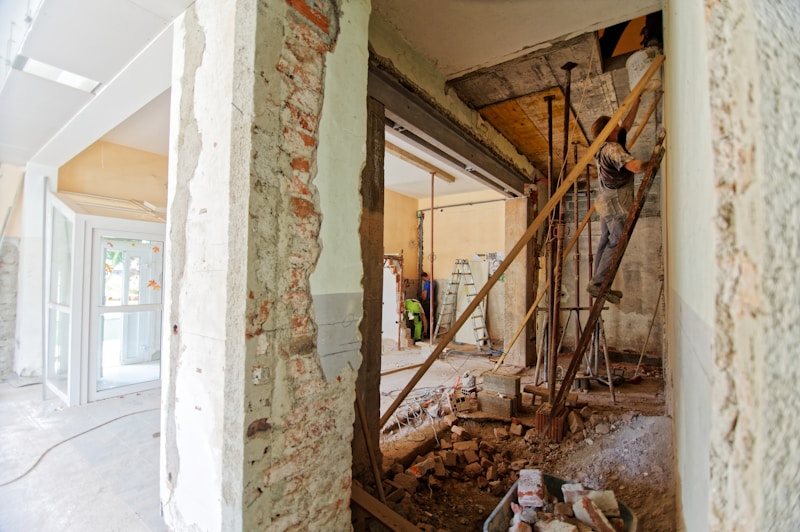Are you tired of staring at those worn-out walls, feeling an itch for change that just won’t go away? Do you daydream about a fresh start, where every nook and cranny of your home sings with new life? Whether it’s the layout or a desire for modern amenities, you might be stuck with the big question: Should you renovate or rebuild?
This guide will take you through the pros and cons of both options, helping you make an informed decision. From understanding your home’s structural integrity to the cost implications of each choice, we’ll explore every aspect to help you determine whether to grab a paintbrush or start from scratch with a wrecking ball.
Understanding Your Home’s Current Condition
Before deciding to renovate or rebuild, it’s crucial to assess your home’s current condition. Both the structural integrity and aesthetic appeal play important roles in guiding your decision. By thoroughly evaluating your home, you can determine whether a fresh coat of paint will suffice or if a full rebuild is necessary.
Evaluating the Structural Integrity
The first thing to do is inspect the structural condition of your home. Examine the foundation, walls, roof, and floors for cracks, sagging, or signs of damage. These could indicate more severe structural issues that may be costly to fix through renovation alone. If your home has significant issues with structural stability, it may be more cost-effective to rebuild rather than repair.
It’s also essential to inspect plumbing, electrical wiring, and HVAC systems. Check for outdated systems, leaks, or poor ventilation. Replacing these systems can be costly, but they’re essential for a safe and comfortable living environment. If these systems are outdated and require major upgrades, rebuilding could be the smarter option in the long term.
Assessing Aesthetic Appeal and Functionality
Next, take a good look at the overall appearance and functionality of your home. Does your home feel outdated, cramped, or lack modern amenities? Are you struggling with a poor layout or insufficient storage? Assess whether these issues can be fixed with cosmetic changes, such as renovations, or if more structural changes are needed.
For instance, older homes might have character, but they often lack energy-efficient features and modern layouts. If you’re simply tired of the look of your home, a renovation could be a cost-effective solution. However, if your home no longer suits your lifestyle, rebuilding may give you the flexibility to create a more functional space.
Considerations for Renovation

If your home is structurally sound and your primary goal is to refresh its appearance or improve functionality, renovation might be the best option. However, there are several important factors to keep in mind before starting a renovation project.
1. Determining the Scope of the Renovation Project
One of the first steps in deciding whether to renovate is defining the scope of your project. Are you looking to update your home’s appearance with a new paint job and fresh flooring, or are you considering a full kitchen or bathroom remodel? Understanding the scale of your renovation helps you budget effectively and set realistic timelines.
Budget tip: Keep in mind that smaller renovations, such as painting or updating fixtures, can make a big difference without a hefty price tag. On the other hand, larger renovations, like structural changes or adding a new room, may require a significant financial commitment.
2. Consulting with Professionals
Before diving into renovations, it’s essential to consult with professionals, such as contractors, architects, and designers. They can help you assess the feasibility of your renovation ideas, provide insight into potential challenges, and offer suggestions for maximizing your space.
For example, if you’re planning on changing the layout of your home, a professional designer can help you reimagine your space while ensuring that your renovation stays within budget.
3. Exploring Different Renovation Options
Once you’ve defined your goals and consulted with professionals, it’s time to explore renovation options. Smaller projects, such as painting or flooring upgrades, can be handled quickly and cost-effectively, while more extensive projects may require careful planning.
If your renovation involves painting, hiring a skilled commercial painting contractor ensures that your walls and finishes are long-lasting, durable, and done with precision. The quality of the paint job can drastically impact the overall look and feel of your home, so don’t cut corners on professional services.
Weighing the Benefits of Rebuilding

In some cases, rebuilding your home might be the more practical option, particularly if your home has severe structural issues or requires extensive updates. Let’s explore the key benefits of rebuilding and when it makes the most sense.
1. When Rebuilding Might Be Necessary
If your home’s foundation or structural components are beyond repair, rebuilding may be more cost-effective than attempting piecemeal repairs. Severe water damage, foundation cracks, or an outdated electrical system that doesn’t meet current safety codes are all signs that rebuilding might be necessary.
2. Advantages of Starting Anew
One of the most significant advantages of rebuilding is the ability to customize your home to suit your exact needs. You’ll have the freedom to design everything from the floor plan to the smallest details, ensuring that your home fits your lifestyle.
Building a new home also allows you to incorporate energy-efficient features, modern layouts, and sustainable building practices. You can add smart home technology, solar panels, and state-of-the-art appliances that may be difficult or costly to integrate into an older home.
3. Financial Considerations of Rebuilding
While rebuilding can come with higher upfront costs compared to renovation, it may offer long-term savings through reduced maintenance and better energy efficiency. Additionally, modern homes typically have higher resale values, making rebuilding a solid investment if you plan to sell in the future.
Budget Tip: Don’t forget to budget for the demolition of the existing structure. Planning your demolition carefully can minimize costs and avoid delays, helping to streamline the rebuilding process. Check out: Step-By-Step Guide to House Demolition.
Making an Informed Decision: Renovate or Rebuild?
Now that you’ve evaluated your home’s condition and weighed your options, it’s time to make a decision. Consider the costs, timeframe, and long-term goals when deciding whether to renovate or rebuild.
Key Factors to Consider:
- Budget: What’s your financial situation? Renovation might be more affordable upfront, but extensive repairs can add up quickly.
- Timeline: How quickly do you need the project completed? Renovations typically take less time, but rebuilding allows you to avoid living through renovations.
- Lifestyle Needs: Does your current home layout work for your lifestyle? Rebuilding gives you a blank slate to create the perfect space, while renovation focuses on improving what’s already there.
Consulting with Professionals
Always consult with experienced professionals, such as contractors, architects, and structural engineers, before making a final decision. Their insights can provide you with realistic estimates, timelines, and design ideas, helping you make the most informed choice for your home.
Conclusion: Transform Your Home with the Right Decision
Whether you choose to renovate or rebuild, the ultimate goal is to create a home that brings you joy and meets your needs. By carefully evaluating your home’s condition, weighing the costs and benefits, and consulting with professionals, you’ll be well-prepared to make the best choice.
With the right plan in place, you can transform your house into the home of your dreams. Good luck on your renovation or rebuilding journey!
FAQ
What factors should I consider when deciding to renovate or rebuild?
You should evaluate your home’s structural condition, consider your budget, timeline, and long-term goals. If your home has severe structural issues, rebuilding may be more cost-effective than extensive renovations.
Is it more expensive to rebuild than to renovate?
Rebuilding is often more expensive upfront, but it can save money in the long run through lower maintenance costs and energy efficiency. Additionally, a new home can have a higher resale value.
When is it necessary to rebuild rather than renovate?
Rebuilding is often necessary if your home has severe structural damage, such as foundation problems, water damage, or outdated electrical systems that require extensive updates.
How can I budget for a home renovation or rebuild?
Start by consulting with contractors and architects to get accurate estimates. Make sure to factor in unexpected costs like demolition, permits, and potential delays. Consider your long-term plans to ensure your investment is worthwhile.





